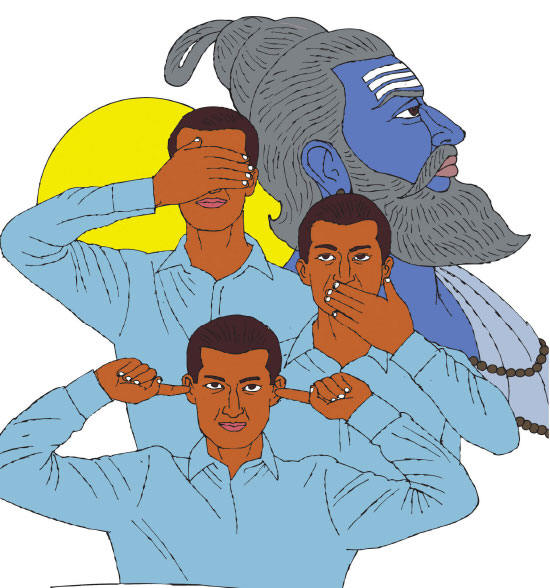TreeInTheSeed17
Sakthi Vikatan
05 Aug, 2014
By Sēvāratṉā Doctor T.S. Narayanaswami, Images: Aras
Sāṁkhya Yogam
Sastras state there are three causes for a multitude of human miseries,
problems, sorrows, and losses and the consequent occurrence of
constrictions and mental stress: Desire, Anger, and Fear. Bhagavan
Krishna points out in the Bhagavadgītā’s second Chapter, Samkhya Yoga
the cause and effect of the three entities and the pathways of relief
from them.
Of the important six Darśanas (Doctrines), Sāṁkhya is one, Kapila Muni,
its proponent.
Sāṁkhya = meter or measure. Samkhya consists of the 25 Tattvas produced
by Puruṣa and Prakṛti. Tattvas are the Sāṁkhya and the pathways of
pursuit are the Aṉuṣtāṉam or Yoga, according to Gita. Aṉuṣtāṉam =
Aṉutāṇam =
அனுட்டானம்
=
observance of religious austerities.
Tattva enquiry is acquisition of knowledge; observance of such is
Yogam.
Desire, Anger, Fear…
Attachment to
objects is commonplace. Attachment becomes desire.
When desire goes beyond its scope, it becomes greed. When greed
does not find fulfilment, disappointment ensues and morphs into anger.
Anger causes mental confusion, which leads to memory loss and
alienation. They become fear and fright or panic.
Sacred Pipal tree has small almost invisible seeds.
The seed falls into the crack in the rocky wall of the house.
Imbibing the rain water falling on the wall, the seed grows into a
sapling, becoming a tree and demolishing the wall and the house.
Likewise, small desires become a seed, a sapling, a plant, a tree and
demolish the edifice of life.
When the seed falls on the fertile ground, there are tangible benefits.
When it falls on a wall and grows, who gains from it?
It causes fear because the wall might collapse. To prevent such
eventuality, it is not enough to cut the branches, but to cut the tree
root and all and cauterize the roots in the wall with acid. We should
regularize our life. We should eradicate desires completely.
When Greed rears its ugly head…
Earning wealth with honesty and hard work and living a simple life are
signs of exemplary life, giving us fulfilment, mental peace… Honesty and
discipline become the well-laid path. Contrarily, sometimes, in his mind
desire sprouts. He desires, seeing the well-to-do, to become wealthy
like them holding abundant liquid cash in the bank, owning a car and a
palatial house, employing servants, and living a life of fame and name.
His mind becomes restless to get them all at once. The neighbors inflame
and heighten his desire. He is despondent in his mind to obtain
financial abundance and freedom.
He does not examine whether his ways of attaining the object are
fair or foul.
His greed finds initial fulfilment. To all those opposing him in his
path of enrichment, he shows anger, impatience and enmity. He comes to
the point of safeguarding the wealth he accumulated.
Because he earned his wealth in a criminal enterprise, he suffers
guilt complex. He
entertains fear. He fears
punishment for accumulating wealth by illegal means. He wonders what he
could do. He loses his self-confidence and trust in others.
He suffers sorrow and a sense of loss amid plenty.
The Five Senses for self-control
No Sastras declare that one should not entertain desires. The desires
should be justifiable. One should have adequate ability to fulfill his
desires. He should undertake proper efforts and wait with patience for
the right time to attain it.
Nothing is wrong to enjoy a comfortable living, have a good family life
with wife and home, earn enough to meet the essential needs, entertain a
mental strength not to gain by deception, attain higher status by one’s
own endeavor, and adopt an attitude of ‘Live and let live.’
Love and virtue in place in wedded life
அன்பும் அறனும் உடைத்தாயின் இல்வாழ்க்கை
பண்பும் பயனுமது.
45 Tiruvalluvar
Of duty and reward. Tiruvalluvar Verse 45.
Nothing is wrong in desiring for a lofty life of love and virtue. There
is no disappointment and no fear.
God has given us five organs such as body, mouth, eyes, nose, and ears,
for fulfilling bodily needs and desires. The mouth (tongue) is there to
satisfy hunger and taste with the object of not injuring the body and
the mind.
Tiruvalluvar says:
'ஒருமையுள்
ஆமைபோல் ஐந்தடக்கம் ஆற்றின்
எழுமையும் ஏமாப்புடைத்து’
- 126
126. Control of the five senses like the tortoise will safeguard you
through seven births.
Tortoise is safe when it withdraws its four legs and the head under its
hard shell. Likewise, when one has the maturity to withdraw the desires
of one’s senses under the hard shell of one’s mind, he could live a life
of strength and sobriety.
Control the mind!
Learn to live with control of the organs. Gita teaches us after
controlling the organs, dwelling on the desires of the organs in the
mind is rank stupidity.
The devotees fast and eat only one meal a day on
Ṣaṣṭī and
Ekādaśī.
Some may not eat on those days. Some observe silence. These are good for
the body and the soul. It is important to control the organs. We should
not entertain thoughts of delectable foods as we fast.
Ṣaṣṭī =
Religious observance on the sixth day of the bright fortnight, every
month.
Ekādaśī = 11th Lunar day on the waxing and the waning moon,
two Ekadasis in a month for the welfare of body, mind and soul.
Some, besides observing a vow of silence, engage in listening intently
to the conversations of others. Some
others engage in written notes and
extract work out of servants and others. The day after the fast, some
gorge themselves with missed delectable foods besides the food meant for
the day. Some others draw the attention of others telling them
frequently of their adherence to fasting. Gita tells these do not amount
to control of the senses.
Having controlled the organs, those dwelling on the activities of those
organs in the mind are idiots. Gita tells it is false observance. Gita
further says, it is unnecessary to observe fast to please God and just
observing rectitude is good enough.
God gains no benefit from our fasting and inherent suffering.
Fasting is good for our health. Our ancestors enjoined us for our
benefit observance of general vows, fasting, vow of silence, vow of
circumambulation in the temples… Gita’s thrust in its message is God
derives no satisfaction from our hypocritical fasting.
Gita’s teaching is, “Go ahead
with fasting if it helps removal of desires, mitigation of anger, and
eradication of fear.”
The tree will grow.
-------------------------------------------------------------------------------------------------------------------------------
Krishna and Durvāsar!
Once in Brahmaloka, there was a dispute: Who is the Naiṣtika
Brahmachari? Who is the perennial abstainer from food?
Narada raised these questions.
Brahmadeva answered, “The perennial Naiṣtika Brahmachari is Bhagavan
Krishnan; Durvāsa Muni is a daily abstainer from food.” Narada and other
Devas could not draw conciliation between facts and perception and said,
“Krishna: a Brahmachari, sporting with thousands of Gopis? Durvāsa a
quater in die
eater in constant hunger, an abstainer from food? quater in die = four
times a day (Latin)
Brahmadeva told Narada, “Narada, go to Dwaraka, see Krishna and ask him,
‘Who is the eternal abstainer from food?’” ‘Bhagavan will explain and
answer the question with proof.’ Likewise go to Durvāsa and ask him,
‘Who is the daily abstainer from food?’
‘Bhagavan Krishna is that one,’ Durvasa will say with proof.
Narada went to Durvāsa and asked him, “Who is the Naiṣtika Brahmachari?”
The answer came from Durvasa, “Bhagavan Krishna is the One. Though
surrounded by thousands of Gopis, he lives among them as Parabrahmam.
Gopis love him. They are involved with him. Krishna in a state of
dispassion, loves all Jīvātmas (= embodied souls = we, the people). He
transcends passion, bondage and friendship. He is the Naiṣtika
Brahmachari.” That moment Narada understood the philosophy of ‘Love of
Krishna.’
Narada went to Dwaraka and paying homage to Krishna asked him,
“Paramātmā, Paramadeva says, ’Durvasa is the eternal abstainer from
food, though he eats four times a day, unable to tolerate the hunger
pains.’ How could that be Durvasa is the eternal abstainer?’”
Krishna answers, “Narada, it is true. Durvasa does not eat anything for
himself. Whatever he eats, he utters, ‘Kṛṣṇārppaṇam (=Dedication to
Krishna)’ even when he sips water. All that (food and water) come to me.
He is the eater; I am the hunger-appeased. Now tell me who the abstainer
is? Is not he the real abstainer?” Bhagavan continued, “The deeds are
not important; but the thoughts behind them are important. Karma is
important. But, who is the enjoyer of the fruits of Karma?” Now only
Narada understood the nature of Karma.
